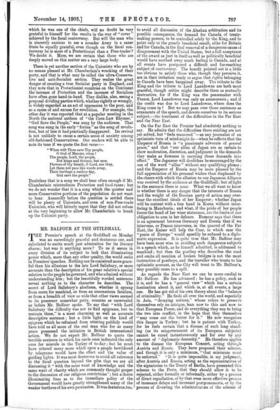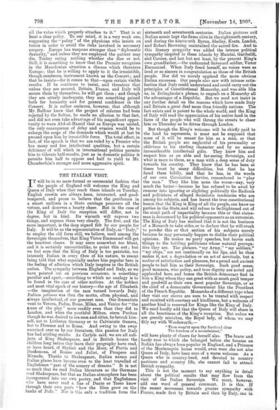MR. BALFOUR AT THE GUILDHALL.
THE Premier's speech at the Guildhall on Monday was an exceedingly graceful and dexterous one, and calculated to excite much just admiration for its literary charm ; but was it anything more ? To us it seems in every division of its subject to lack that illuminating power which, more than any other quality, the world seeks in Premiers' speeches. Nothing can be conceived more grace- ful than his allusions to the late Lord Salisbury, or more accurate than the description of his great relative's special relation to the peiple he governed, and who admired without understanding him ; but the beautifully worded sentences reveal nothing as to the character he describes. The secret of Lord Salisbury's aloofness, whether it sprang from scorn for mankind, or from an unconscious fatalism, or from a breadth of view so wide that other views seemed to its possessor somewhat petty, remains as unrevealed as before Mr. Balfour spoke. To say that " with Lord Salisbury the difficulty was not to-find epigrams, but to restrain them," is a most charming as well as accurate descriptive sentence ; but a little light on the kind of epigram which he refrained from uttering publicly would have told us all more of the real man who for so many years possessed the initiative in British international action. We do not expect Mr. Balfour to quote the terrible sentence in which his uncle once indicated the only cure for misrule in the Turkey of to-day ; but he must have uttered many more which upon a people bewildered by telegrams would have the effect and the value of guiding lights. It was most dexterous to avoid all reference to the fiscal question beyond the gibe that we are all discussing it " with the same want of knowledge and the same want of charity which are commonly thought proper to the discussion of our religious convictions"; but a dozen illuthinating lines as to the immediate policy of the Government would have greatly strengthened many of the weaker brethren of his own persuasion. It was dexterous, too, to avoid all discussion of the Alaskan arbitration and its possible consequence, the demand for Canada of treaty- making powers, to be controlled solely by the King, and to point only to the greatly beneficial result, alike for Britain and for Canada, in the final removal of a dangerous cause of disagreement with the United States; but a full acceptance of the award as just in itself as well as politically beneficial would have soothed away much feeling in Canada, and at all events have postponed a difficult and far-reaching subject of controversy. The benefit pointed out is a little too obvious to satisfy those who, though they perceive it, are in their irritation ready to argue that rights belonging to Canada have been bargained away. The tribute to the King and the tribute to Lord Lansdowne are both most graceful, though critics might describe them as mutually destructive, for if the King was the peacemaker with France, Lord Lansdowne was only an amanuensis ; and if the credit was due to Lord Lansdowne, where does the King come in ? But we may pass over those sentences as ornaments of the speech, and devote ourselves to its serious subject,—the treatment of the difficulties in the Far East and the Near East.
On the Far East the Premier had absolutely nothing to say. He admits that the difficulties there existing are not yet solved, but "feels reassured "—as any journalist of an optimistic turn of mind might do—when he reflects that the Emperor of Russia is "a passionate advocate of general peace," and that "our allies of Japan are as certain to show moderation, discretion, and judgment in the demands they make as firmness in carrying those demands into effect." The Japanese will doubtless be encouraged by the use of the word " allies " without any qualifying phrase ; and the Emperor of Russia may be more pleased by the full appreciation of his personal wishes than displeased by the cheers with which the allusion to our Japanese Alliance was received by the audience at the Guildhall ; but of light in the sentence there is none. What we all want to know is whether there is any danger that the interests of Russia and the weight of the Russian party of action may over- bear the excellent ideals of her Emperor; whether Japan will be content with a free hand in Korea without inter- fering in Manchuria; and what, if file pride of her people forces the hand of her wiser statesmen, are the limits of our obligation to arm in her defence. Rumour says that there is an agreement between Germany and Russia that if we intervene, or France intervenes, in the quarrel of the Far East, the Kaiser will help the Czar, in which case the "peace of Europe" would speedily be reduced to a diplo- matic expression. It is quite true that Mr. Balfour may have been most wise in avoiding such dangerous subjects in a speech which, as he himself admitted, is addressed to mankind ; but then the postboy who describes the road and omits all mention of broken bridges is not the most instructive of postboys, and the traveller who trusts to his optimistic account, as the City will trust to Mr. Bailout's, may possibly come to a spill.
As regards the Near East we can be more cordial to Mr. Balfour. He has advanced ; he has a policy, such as it is, and he has a " general view " which has a certain fascination about it, and which is, at all events, a large one. He has got rid of his own theory about the " balance of criminality." He finds all over the world, and especially in Asia, " decaying nations," whose rulers to preserve themselves rely on intrigue, lean now to this and now to that European Power, and do everything they can to bring the two into conflict, in the hope that they themselves " may come out the better for it." He now recognises this danger in Turkey ; but he is patient with Turkey, for he feels certain that a disease of such long stand- ing (as its misgovernment of its European subjects) cannot be cured instantaneously and for ever by any amount of " diplomatic dexterity." He therefore applies to the disease the European Concert, acting through Austria and Russia. They have proposed their scheme, and though it is only a minimum, "that minimum must be enforced." " It is quite impossible, in my judgment, after Austria and Russia, acting as the representatives of the signatories to the Treaty of Berlin, have presented this scheme to the Porte, that they should allow it to be rejected, either formally or informally, either by a process of direct repudiation, or by that even more effective process of incessant delays and incessant postponements, or by the process of divesting the administration of the scheme of all the value which properly attaches to it." That is at least a clear policy. To our mind, it is a very weak one, suggesting the " policy" of the physician who insists on tonics in order to avoid the risks involved in necessary surgery. Europe has weapons stronger than " diplomatic dexterity," and unless they are employed the patient may die, Turkey caring nothing whether she dies or not. Still, it is something to know that the Premier recognises in the Macedonian situation a disease which threatens Europe ; that he is willing to apply to it the irresistible, though cumbrous, instrument known as the Concert; and that lie insists—for it comes to that—upon certain visible results. If he continues to insist, and threatens that unless they are secured, Britain, France, and Italy will secure them by themselves, he will get them ; and though they are utterly inadequate, they are something gained both for humanity and for general confidence in the Concert. It is rather ominous, however, that although Mr. Balfour knew that the project of reforms had been rejected by the Sultan, he made no allusion to that fact, and did not even take advantage of his magnificent oppor- tunity to warn Abd-ul-Hamid that as Europe was united, the only consequence of delay and evasion would be to enlarge the scope of the demands which would at last be pressed upon him by irresistible force. The total effect, in fact, of the speech is that we are ruled by a Premier who has many and fine intellectual qualities, but a certain deficiency of will which in international politics permits him to tolerate half-results, just as in domestic politics it permits him half to oppose and half to yield to Mr. Chamberlain's stronger and more aggressive spirit.















































 Previous page
Previous page